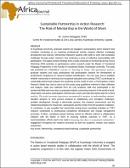| dc.contributor.author | Nabaggala, Justine | |
| dc.date.accessioned | 2023-02-20T07:33:55Z | |
| dc.date.available | 2023-02-20T07:33:55Z | |
| dc.date.issued | 2020-04 | |
| dc.identifier.citation | Nabaggala, D. J. (2020). Sustainable Partnership in Action Research: The Role of Mentorship in the World of Work. Africa Journal of Technical and Vocational Education and Training, 5(1), 66-74. Retrieved from http://www.afritvet.org/index.php/Afritvet/article/view/104 | en_US |
| dc.identifier.uri | http://www.afritvet.org/index.php/Afritvet/article/view/104 | |
| dc.identifier.uri | https://hdl.handle.net/20.500.12504/1214 | |
| dc.description.abstract | At Kyambogo University, graduate students are engaged in participatory action research that considers mentoring as an inspiring professional activity towards effective knowledge development and sharing. Mentorship empowers students with skills to solve real workplace challenges through action research; thus achieving a sense of collective responsibility with participants. This paper presents findings from a study conducted on mentorship during Future Workshop (FW) activities in participatory action research under the Master of Vocational Pedagogy Programme, in the Faculty of Vocational Studies, Kyambogo University. The study was premised on a theoretical concept of “learning by doing” that guaranteed mentors, graduate students and study participants full participation towards the development of professional competences in research problem identification. The core issue was to establish whether mentorship in technical and vocational education and training (TVET) contributed to sustainable partnerships between the academia and the world of work. A Participatory Action Research Model was used to carry out this study using qualitative methods of data collection and analysis. Data was collected from ten (10) academic staff who participated in the mentorship field work exercises on graduate students conducting research in the world of work. Observation and active participation methods were used to provide descriptive data for content analysis. The article presents experiences encountered by mentors in understanding students’ situation analyses or work process analyses in establishing core workplace challenges; problem development through a democratic process; the research environment and the relationship between the researcher, participants and the mentor from the academic institution. In conclusion, it was revealed that mentorship during future workshop activities in TVET research contributed to professional competence development and change management processes. Further, competency-based training cannot be effective without a collaborative initiative with the World of Work in ensuring realistic outcomes in TVET. As a recommendation, efforts need to be made in ensuring that there is maintained stakeholders’ engagement throughout the research processes by both the academic mentors and student researchers | en_US |
| dc.language.iso | en | en_US |
| dc.publisher | AfriTVET | en_US |
| dc.subject | Mentorship | en_US |
| dc.subject | Competency-based training | en_US |
| dc.subject | Sustainable partnership | en_US |
| dc.title | Sustainable Partnership in Action Research: The Role of Mentorship in the World of Work | en_US |
| dc.type | Article | en_US |

